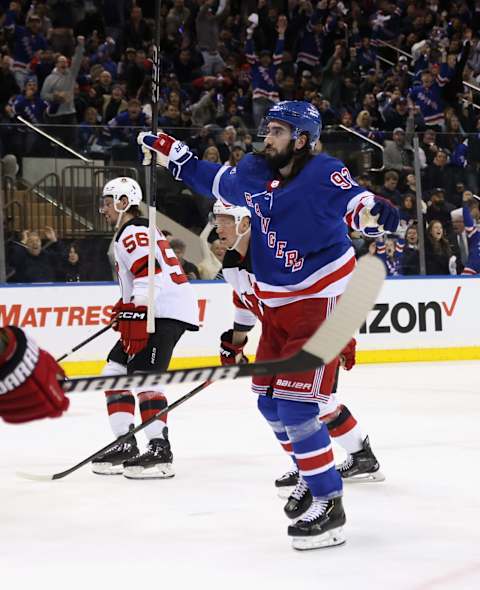A look at the Zibanejad-Brassard trade 7 years later


Today marks the seven-year anniversary since the New York Rangers acquired Mika Zibanejad from the Ottawa Senators for Derick Brassard in 2016. To celebrate, we look back on why the trade was made and how the players have faired since then.
New York Rangers fans should smile today. As I write this, it’s July 18. It marks seven years since the Rangers fleeced the Ottawa Senators for Mika Zibanejad in 2016. The trade saw Derick Brassard head to Ottawa and Zibanejad come to Broadway. The Senators sent Zibanejad a 2018 second-round pick(Jonatan Berggren) to the New York Rangers for Brassard and a 2018 seventh-round pick(Luke Loheit).
Looking back, it’s clear that the Rangers got the better end of the deal from the get-go. Zibanejad turned into a star forward, while Brassard struggled during his time with the Senators. It makes you wonder why this trade happened in the first place, right?
A look at the Zibanejad-Brassard trade 7 years later: Why it happened?
Before the trade, Zibanejad,22, showed promise, with two consecutive 20-goal seasons and a career-high in points. He started showing why Ottawa selected him sixth overall in the 2011 NHL Draft.
Meanwhile, there was a lot to like about Brassard. Drafted sixth overall in 2006 by the Columbus Blue Jackets, he made his NHL debut in 2008 and spent five years there before being traded to New York with Marian Gaborik in 2013. Through his 254 games as a Ranger, he scored 174 points, including one 60-point season in 2014-15. But that season, his 14.84 shooting % was three points higher than his career average, and he hasn’t amassed that mark since.
The trade between the Rangers and Senators was based on financial considerations, as both teams dealt with salary cap issues. Zibanejad had been on a cheap contract worth $2.625 million per season, which was set to expire after the 2016-17 season. His final year on the contract was worth $3.25 million in salary, and he was due for a significant raise.
In contrast, Brassard had a higher cap hit of $5 million, but his contract was frontloaded, and he was only owed $3.5 million during the last two seasons. Rangers general manager Jeff Gorton liked Zibanejad’s small $2.625-million cap hit, as he still had to pay Chris Kreider and Kevin Hayes.
By trading Brassard, he freed up cap space, which he used to retain both players on Broadway. Initially, it looked like a good cap dump move. Yet, in hindsight, it turned into more than that.

A look at the Zibanejad-Brassard trade 7 years later: How the Rangers scored:
Fast forward seven years, and the trade remains a source of jubilation for Rangers fans. Zibanejad has flourished into a first-line center, amassing a staggering 455 points in 486 games as a Ranger. He even hit a career-high in assists (52) and points (91) in the 2022-23 season. Remember that sweet 8-year contract worth $8.5 million per season he signed in July 2017!
“The only thing I wanted to ensure is that they were right trading for me,” Zibanejad told the New York Post in 2019. “I think they’re happy.” Brass, I still think he’s a great player.” “I respect the guy. I like the way he’s played and the type of player he is. I don’t know if honor is the right word, but there is something special about getting traded for a guy like that. I respect him and have an appreciation for him.”
“I’m thankful for all the years and all the things we went through in Ottawa. Now here I am today. I feel like it was just different. The opportunity I’ve been given here, as well — not given to me, but making sure that I work for it and earn it. It’s been good.”
The second-round pick that Ottawa sent to New York ended up in Detroit’s hands after the Rangers traded it for defenseman Brendan Smith in 2017. The Red Wings selected Swedish center Jonatan Berggren 33rd overall in 2018, who made his NHL debut this past season.
The Senators watched helplessly as Zibanejad turned into one of the best centers in hockey. But there’s also a reason why Ottawa general manager Pierre Dorion acquired who he did. Let’s dive into the other end of the deal.

A look at the Zibanejad-Brassard trade 7 years later: How the Senators failed:
Ottawa chose Luke Loheit, an American winger, with their seventh-round pick. He currently plays for the University of Minnesota-Duluth Bulldogs. However, his rookie season in 2019-20 was not impressive, as he only scored five goals and had six points in 33 games. Similarly, this past season was underwhelming, with only three goals and five points in 28 games.
During his time in Ottawa, Brassard’s performance did not meet expectations. In his first season, 2016-17, he only had 39 points in 81 games, which disappointed the management and fans, considering his previous successes. However, he did redeem himself with 11 points in 18 games as the Senators reached the Eastern Conference final.
Ultimately, the Senators salvaged something from this deal when they traded Brassard, Vincent Dunn, and a third-round pick to the Pittsburgh Penguins. That package netted them Ian Cole, Filip Gustavsson, and Pittsburgh’s first-round pick in 2018 (Jacob Bernard-Docker, 26th overall)
Cole was dealt to the Columbus Blue Jackets three days later for Nick Moutrey and a third-round pick in 2020.
Brassard had a respectable 38 points in 58 games before the trade. Brassard had a rough go during the 2018-19 season. After a groin injury on October 27, he had to sit out nine games, and when he finally returned to the ice, he struggled to find his groove. Only three points in 17 games by the holiday break? That’s tough. So Brassard got bumped down to the third-line center. In 40 games for Pittsburgh that season, he only scored nine goals and tallied 15 points.
After the season, Brassard told the Post Gazette(Subscription required), he had set personal goals of getting 50 to 60 points that season, but being stuck in limited playing time as a bottom-six forward dashed those hopes. On February 1, 2019, Brassard was in yet another trade from the Penguins to the Florida Panthers. Alongside Riley Sheahan and three draft picks, he headed to the Sunshine State in exchange for Nick Bjugstad and Jared McCann.
His time with the Panthers was short-lived. In just ten games, he scored one goal and assisted on three others.
The Panthers traded him again in March. of 2020, this time to the Colorado Avalanche. They swapped Brassard for a third-round pick in the 2020 NHL Entry Draft. At the end of the season, Brassard’s stats reflected his nomadic journey across the three teams. He scored 14 goals and earned 23 points during the 2018-2019 season.
That offseason, he signed a one-year $1.2 million deal with the New York Islanders, where he rediscovered his play. He netted 10 goals and contributed 32 points in 66 games. In the playoffs, he scored two goals and notched eight points in 18 playoff games during the Islanders’ run to the Eastern Conference Finals. But despite the contributions, the Islanders didn’t view him as a keeper, as Brassard hit free agency again.
From there, he bounced around from the Arizona Coyotes to the Philadelphia Flyers to the Edmonton Oilers before becoming a Senator again in the 2022 offseason. Brassard had 13 goals and 30 points in 62 games last season and is currently a free agent. The Senators likely won’t resign him. If they wanted him back, it would’ve been done by now.
Looking back, this was one of the best trades in Rangers’ history. Rangers fans should keep grinning and hope Mika’s magic will continue to dazzle on the ice in the upcoming 2023-24 season. What once looked like a terrible deal (Read the comments) turned into a great one. It shows the importance of letting the results do the talking.